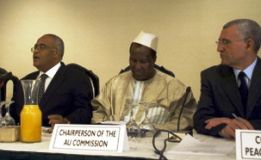Sudan, Darfur rebels in new round of peace talks – AU
Sept 14, 2005 (ABUJA) — Sudan’s government and rebels from its western Darfur region were to gather in the Nigerian capital Thursday for a new round of peace talks aimed at ending a crisis that has displaced millions, the African Union said.
 The rebels, though, are fighting among themselves, further undermining a difficult peace process. Five previous rounds of A.U.-brokered peace talks have been inconclusive and ceasefires have been repeatedly violated.
The rebels, though, are fighting among themselves, further undermining a difficult peace process. Five previous rounds of A.U.-brokered peace talks have been inconclusive and ceasefires have been repeatedly violated.
Representatives of “all the parties to the conflict will arrive” by Thursday and attend the opening session, A.U. spokesman Moussa Hamani said.
Darfur’s main rebel group, the Sudan Liberation Army, has split into factions, one led by its Secretary-General Minni Minawi and another led by its Chairman Abdel Wahid Nur. Mahgoub Hussain, a spokesman for Minawi, said his faction wouldn’t attend the Abuja talks until the split was resolved at an internal conference he said was scheduled to start in Darfur on Sunday.
But Abdul Latif, a Nur loyalist, was in Abuja as a Sudan Liberation Army delegate. He said his main objective was “to see our people returned to their own original villages.”
Hamani, the A.U. spokesman, said the issue of refugees and the displaced wasn’t on the agenda. He said the open-ended talks were instead to focus on power and wealth sharing and security.
After decades of low-level clashes over land and water pitting nomads and villagers against one another in Darfur, rebels from ethnic African tribes launched a large-scale conflict in early 2003, accusing the Arab-dominated central government of neglect. The central government is accused of responding by unleashing Arab tribal militias known as Janjaweed to murder and rape civilians and lay waste to villages.
At least 180,000 people have died from hunger and disease in the ensuing chaos, and millions fled their homes. There are no firm estimates for the number killed in fighting and Janjaweed attacks.
In an interview with The Associated Press Wednesday, Sudanese Foreign Minister Mustafa Osman Ismail said his government may have reacted too harshly to the Darfur rebels, but he rejected characterizations of the conflict as ethnic-based.
(AP/ST)
